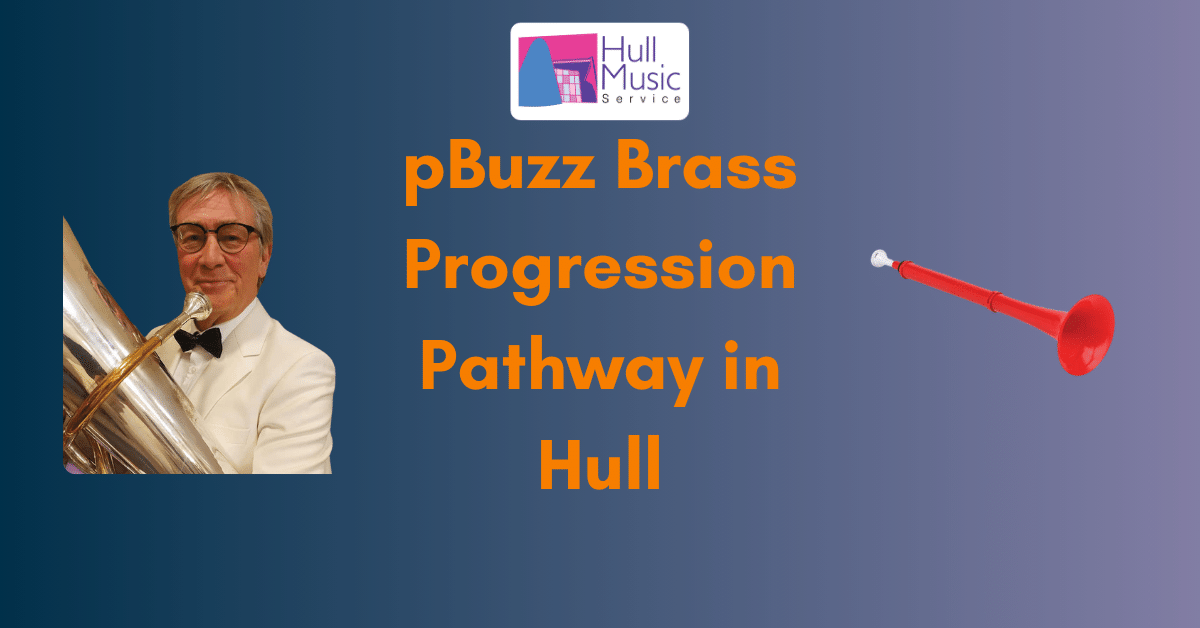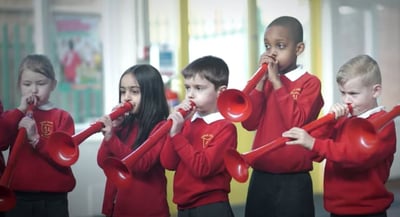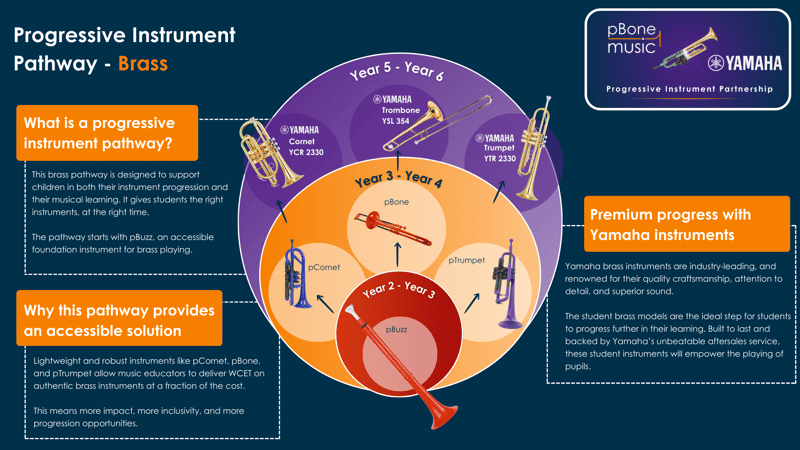pBuzz Brass Progression Pathway in Hull
March 20th, 2024
4 min read

pBuzz is designed to introduce young minds to the world of brass music and is being used around the world as a whole-class instrument for beginners.
Shaun Crowther, Music Teacher at Hull Music Service, who has also held the position of Principal Tuba in renowned bands like Grimethorpe Colliery Band, shares his insights on the impact of pBuzz in early brass education. With his extensive background in music performance and education, Shaun's perspective delves into the instrument's ability to revolutionise posture, cultivate musical maturity, and foster inclusivity within the classroom. It is the first step in a progressive instrument pathway.
Addressing Posture and Handling Issues
“As teachers, we had difficulty with year four children holding instruments," says Shaun. "It was a backwards move in regards to the fact that when children did carry on to individual, peripatetic lessons, we had to correct so many issues that they'd gathered over the years, such as bad posture and holding instruments incorrectly."
This problem with posture also extended to the practical considerations for the classroom: for delivering whole-class brass lessons, traditional instruments were not the right choice at this stage.
"The amount of space we had in some rooms wasn't really enough for trombones and tubas, so it just wasn't working.”
Elevating brass education at Maybury Primary School
A success story for Shaun came at Maybury Primary School in Hull, where Headteacher Alison Grantham is herself a brass player. By introducing students to the pBuzz in year three, the school sets the stage for progression. Year four marks the transition to traditional brass instruments, and the results have been nothing short of remarkable. Graduates of this program showcase enhanced skills and musical maturity, attributes that are nurtured by the foundation laid through pBuzz learning.
"Maybury Primary is extraordinarily brass-focused," continues Shaun. "They now have a primary, thirty-piece brass band for students in years five and six. We start them with pBuzz in year three, which is what I think they are intended for, and then in year four, they get a brass instrument. And it has been very successful. Most of the children in the last three years who have graduated to the brass band have started with pBuzz."
It is a similar tale to the work that Andy Harris and Sheffield Music Hub are undertaking in South Yorkshire, where children are developing their initial skills on pBuzz before progressing further with brass instruments.

Mastering the basics of brass and enhancing concentration
Shaun observes that beginners often struggle when confronted with too many tasks simultaneously, leading to compromised breath control. However, the pBuzz simplifies this process by allowing students to concentrate on the basics—blowing air and moving the slide.
"The kids that start with pBuzz have spent the time learning how to blow and get the basics right," he says. "In other words, you blow a buzz down it and it works. Getting that is so much better when they move on to a brass instrument. It means you can spend an awful lot more time working on posture and performance, which seems to help them advance a lot faster."
This focus on fundamental techniques is aided by the simplicity of pBuzz. Without the distractions of a brass instrument at an earlier age, their focus remains on the core parts of playing, making that step up to a premium brass instrument all the smoother.
"When they are not worried about how they are holding the instrument and pressing valves, they can concentrate on reading music and blowing air, without giving them too much time to think about it.”
Breathing is pivotal to brass-playing, whether children are playing trombone, tuba, trumpet, or cornet (among many others!) With young learners, Shaun has seen the same problem surface time and time again: “The thing that we notice with brass to beginners is that when you are trying to get them to do too many things at once, the first thing that goes is the breathing."
For young children who are first getting to grips with making a sound, making the process as simple and natural as possible is key. "You are learning to read and trying to do all these other actions...and the air stops. Whereas I find pBuzz a much easier process, by simply blowing and moving the slide to focus on the basics.”
"It's a Progression Tool"
Shaun's experience underscores how pBuzz lays a strong foundation, ultimately resulting in a more mature approach to playing brass instruments. But what does this mean for the level of musicianship in his students?
“The quality of the play is, in my opinion, superior because you had to spend a lot of time correcting all the bad postures and the way that they're holding trombones, cornets and the valve instruments," says Shaun.
For young children in WCET, the distractions of traditional brass design can also be a case of much too much, much too young.
"In our lessons before pBuzz, valves were constantly sticking because they weren't holding the brass instruments correctly. And because of that, they weren't actually concentrating too much on their fingers and producing a note. Now it's so simple."
Beyond the practical appeals of pBuzz in the classroom - easier storage, less maintenance, less progression - it is the follow-up that is the real plus point for brass teachers like Shaun.
"In my experience, the follow-on when you get hold of a brass instrument it's more mature. More mature in thought, more mature in approach. The children can concentrate. You can give them an instrument, you can show them how to hold it, they have an appreciation of that, but they can also produce the note.
Because you can concentrate on rhythms and other fundamentals, the way they read music improves. So I would say definitely their brass performance and musical development are better in the long run. It’s a progression tool.”
pBuzz is the first step on the brass progressive instrument pathway.
For whole-class learning, pBuzz takes away the cost, the servicing, the space and gives educators an instrument that is accessible, lightweight, easy to store and maintain...and gives more children the chance to get the basics of brass covered.
Introducing pBuzz at this early stage is so intuitive that primary music teachers without musical experience have delivered whole-class pBuzz lessons in Wales. For brass teachers like Shaun Crowther, it removes the distractions and enhances the fundamental techniques required for progressions.
The next step in the pathway introduces whole-class brass using our brass instruments: pBone, pTrumpet, pTrumpet hyTech and pCornet. With the basics of breathing and music theory in place, pupils are better equipped to further their learning. This means that schools and services can then invest in the best student brass instruments in years 5 and 6: brass instruments from Yamaha Music.
Looking for further support? pBone Music, Chris Fower and ABRSM have partnered together to offer two pBuzz CPD courses for music hubs. pBuzz in the Classroom, A Comprehensive Teacher’s Training gives primary teachers without musical knowledge the tools to deliver pBuzz, just like in Swansea. From Teacher to Trainer, pBuzz Expertise is designed to help music hubs conduct their own pBuzz workshops and training with their staff.
If you are a UK educator interested in learning more about progression with pBone Music, get in touch!
Adam is the Content Manager at pBone Music. This should mean that he’s the ideal person to write about himself, but he finds boasting in the third person a little awkward. He honed his word wizardry with a degree in English Language and Literature at the University of Leeds. He has since written copy for clients and businesses across the land, from awards to something beginning with “z”. He also spent a number of years as a musician. He has written pop songs and even jingles for kids, performed more first dances at weddings than you could shake a pBuzz at, and once played a gig for a pie company at The Etihad Stadium in Manchester. When he’s not reminiscing about those good old days, you might find Adam enjoying the football (although as an Everton fan, that can be difficult). He also loves spending time with his partner, Jen, and his family and friends, and sincerely hopes they feel the same way.
Topics:
